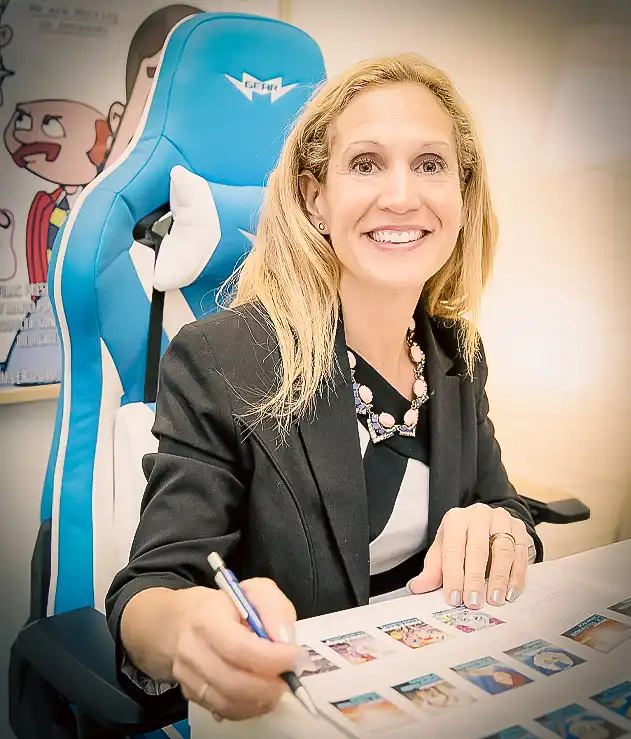 Image by: Jared Quong, VANAS student
Image by: Jared Quong, VANAS student
Ways to Stay Exceptional as a Concept Artist
The need for digital concept art has grown sharply due to the production of video games, movies, and other media. Concept art is a vital part of visual storytelling and defines the visual feel of various projects. For concept artists, being exceptional is key to standing out and winning clients. Whether working independently or in a studio, enhancing your skills and keeping an innovative edge are essential.
Key Takeaways:
- Establish a structured daily routine to dedicate time to your art consistently.
- Have a contingency plan to adapt if your painting schedule is disrupted.
- Develop a sense of the project's arc to maintain artistic continuity and vision.
- Set clear short-term goals to stay motivated and track your artistic progress.
- Practice writing about other artists' work to enhance your artistic analysis and critique skills.
Maintaining a Structured Daily Routine
Creating a concept art schedule that aligns with your lifestyle is essential. Identify when you're most productive—mornings, lunch breaks, or evenings. It's vital to adhere to this schedule regularly.
A daily routine cultivates painting habits integral to your creative process. Allocating time for concept art fosters a structured environment. This motivates regular work on your craft.
Designating a space for painting is also critical. Whether it's your favorite room, a studio, or a specific workspace, this spot minimizes distractions and helps you focus on art creation.
The Benefits of a Structured Daily Regime
- A consistent production schedule fosters discipline and good work habits.
- Setting aside specific times for art ensures total immersion in creativity.
- A structured routine helps with regular practice and skill refinement.
- A designated painting space enhances creativity by reducing distractions.
- Regular sessions lead to artistic development and exploration of new techniques.
A structured daily routine is the foundation of a successful concept artist. It provides the necessary framework for consistent improvement and encourages the development of good work habits.
Having a Contingency Plan
Concept artists need a contingency plan to maintain their artistic productivity. Due to life's unpredictability, interruptions to their schedule are inevitable. Flexibility and adaptability are essential. This ensures an ongoing commitment to their art despite external challenges.
Establish an alternate routine to effectively manage disruptions. Find times for painting during early mornings or late evenings when disruptions occur. Prioritizing your art and having a robust backup plan prevents loss of creative time and keeps your artistic journey's momentum going.
Here are some practical tips for creating an alternate routine:
- Identify potential disruptions: Note possible events or situations that might interrupt your regular painting schedule. This includes work obligations, personal duties, or unexpected emergencies. Planning for these helps you to be better prepared.
- Set realistic goals: Clarify your alternate routine goals, ensuring they are achievable. Having clear objectives maintains focus and motivation, even with schedule shifts.
- Designate a dedicated workspace: Establish a specific area for your concept art, different from your usual spot if necessary. A dedicated space fosters routine and creative immersion.
- Communicate with others: Share your alternate schedule with friends, family, or roommates. This fosters understanding and respect for your dedicated painting time. Encouraging open dialogue ensures their support for your artistic endeavors.
- Stay disciplined: Commit to your alternate routine with the same commitment as you do to your regular schedule. Avoid procrastination and keep art a priority. Consistent effort is crucial for artistic growth.
Having a contingency plan doesn't compromise your work's quality. It's about adapting to changes and innovatively pursuing concept art. Preparedness for disruptions allows for skill enhancement and producing outstanding art, facing any challenge.
Having a Sense of the Project's Arc
Since a concept artist brings artistic visions to life. Understanding the project's arc and ensuring consistency in your work is vital. This profound understanding aids in maintaining artistic continuity.
Concept art transcends mere paintings, digital art, or simple sketches. It weaves a visual story matching the project's theme and vision. Immerse in the project's world to truly capture and animate it through your artistry.
Ensure each artwork smoothly transitions to the next, underpinning earlier themes and concepts. This continuity not only displays your skill but enriches the audience's journey, granting consistency and a sense of belonging.
During your creative process, dive deep into the project's core themes and motifs. This deep dive empowers your artwork with apt symbolism and mood. Thus, it lends significance and resonance to your creations, aligning seamlessly with the project's vision.
As a concept artist, your artistry significantly impacts the project. Your work should narrate a tale, stir emotions, and draw the audience into an enthralling realm.
Painting Themes:
- Delve into the themes and motifs prevalent in the project.
- Identify symbols and imagery that represent the project's core concepts.
- Explore different moods and atmospheres to enhance the impact of the narrative.
By mastering the project's arc, your concept art won't just garner attention; it will pivotally enrich the narrative. Your masterpieces enhance the visual narrative and perfectly convey the underlying message, driving the project toward success.
Setting Clear Short-Term Goals
As a concept artist, setting clear short-term goals to advance in your career is vital. These goals act as benchmarks, helping you monitor progress and keeping you motivated on your artistic path.
One method is to set specific targets, like the number of paintings you aim to complete. This offers a clear goal and helps gauge your productivity and growth.
Participation in exhibitions and showcases should also be a goal. Pinpoint which ones you wish to attend and devise a plan for them. These events not only showcase your work but also open doors for networking and career growth.
Building a strong portfolio is another critical goal. Decide how many pieces you want to add within a timeframe. A diversified portfolio attracts clients and opportunities in the concept art field.
Setting clear short-term goals is essential. It fuels your motivation, provides direction, and enables you to measure your success. Continuously aiming for improvement is key for a concept artist's growth.
Writing About Other People's Work
Writing about the work of other artists is incredibly valuable for concept artists. It allows you to explore different artistic methods and perspectives, which in turn enriches your understanding and appreciation of art. This analysis is an essential step towards enhancing your own skills and expanding your creative vision.
Exploring other artists’ creations offers fresh perspectives, aids in expressing one's artistic beliefs, and can clarify one's values.
The artist's world is limitless. It can be found anywhere, far from where he lives or a few feet away. It is always on his doorstep.
Critically assessing other artists’ work sharpens your artistic insight. It aids you in recognizing what contributes to effective concept art. Such critiques can motivate you to embrace new artistic styles, driving growth and innovation.
Moreover, this practice hones your problem-solving and creative thinking skills. Evaluating aspects like composition and color in others' art provides insights. These insights can transform your own creations and help you tackle artistic challenges.
Benefits of writing about other people's work:
- Gain insights into diverse artistic techniques and approaches.
- Broaden your creative horizons and enhance your artistic abilities.
- Express and refine your own artistic beliefs and values.
- Deepen your understanding of exceptional concept art elements.
- Encourage experimentation with novel styles and techniques.
- Develop keen artistic discernment and problem-solving capabilities.
Writing about other artists' work isn't merely a learning exercise. It's a chance to join the artistic community’s conversation. By sharing critiques and analyses, you contribute to the discourse on concept art and forge connections with other artists.
When encountering intriguing concept art, consider writing about it. Analyze its strengths, pinpoint areas for improvement, and ponder its influence on your art. Writing about others' work enriches your practice and supports the concept art community at large.
Learning a New Technique
Enhancing your artistic skills through new tools and mediums is key to excellence for a concept artist. Embracing an exploratory mindset can infuse your work with innovative ideas, captivating your audience. It enriches your artistic expression, making your style unmistakably unique.
Enrolling in art courses offers a structured way to improve. You gain new techniques from seasoned pros. Courses cater to various interests, whether it's traditional or digital art. They align with your artistic ambitions, pushing you towards your creative pinnacle.
Online resources are another avenue for growth. The web is rich with tutorials, workshops, and forums. These platforms are not just learning spaces but also community hubs. They foster collaboration and inspiration among artists, broadening your creative network.
Artistic Exploration: A Source of Inspiration
To create something exceptional, your mindset must be focused on large and small details.
Artistic exploration transcends learning techniques; it's about pushing your creativity's boundaries. It allows for the discovery of untapped talents, and experimentation unearths new approaches to your artwork.
This journey can lead you to unexpected inspiration sources. Different art styles, iconic artists' works, and various movements enrich your voice. They broaden your horizons, making your art stand out.
Unlocking Your Potential
Learning new skills is an investment in your growth and career. It equips you to handle diverse projects, turning your visions into reality.
- Keep up to date with concept art trends by attending workshops and conferences.
- Experiment with various mediums and styles to fully embrace creativity.
- Collaborate with peers to exchange ideas and boost each other’s creative journey.
Pushing your artistic limits and adopting new techniques makes you stand out as a concept artist. It ensures your artistry keeps evolving, constantly reaching new heights.
The Potential of Online Art Sales
As a concept artist, you can share and sell your work online directly to fans. This opportunity allows you to connect with new audiences and expand your reach. The internet has changed how artists market and distribute their art. It offers the freedom to be an independent seller and take charge of your career.
Online platforms and strategic marketing can open doors to a vast global network of enthusiasts and collectors. You can present your concept art portfolio and establish a robust online presence. This attracts potential buyers worldwide, including those interested in video game art and digital illustrations. The market for your unique creations is expansive and waiting.
Exploring online art sales gives you a convenient platform for selling and introduces new paths to success in the concept art world. A solid marketing plan can increase your exposure, allow you to network with other artists, and grow a devoted customer following. Embrace technology's potential to showcase your artistic talents and captivate art lovers everywhere.
FAQ
How can I stay exceptional as a concept artist?
To excel as a concept artist, tackle certain strategies. Keep a disciplined daily schedule and a backup plan handy. Understanding the entirety of your project and establishing immediate objectives is crucial. Diving into critiques of peers' creations, acquiring new methodologies, and exploiting online art marketing is key to growth and success in your field.
How can I maintain a structured daily regime as a concept artist?
Establishing a firm daily schedule is vital. Dedicate certain hours strictly to your artistry. By setting routines and designating a workstation, you ensure your artistic skills sharpen constantly. This practice breeds steady progression in your art endeavors.
What should I do if my regular art routine is disrupted?
Disruptions to your painting schedule demand a flexible approach. Tweak your timetable to fit art sessions when feasible. Such adaptability and having a plan B ensures art remains a priority. Consistently carving out time for your craft is a must, even amidst interruptions.
What does it mean to have a sense of the project's arc as a concept artist?
Understanding your project's overarching narrative is fundamental. It's about keeping each piece tethered to the last, preserving continuity. A firm grasp of your project's trajectory lets you produce cohesive art. This aligns with the project's ambitions, showcasing your exceptional talent.
How can I set clear short-term goals as a concept artist?
Setting precise short-term goals is crucial to standing out. Aim for specific artworks to complete or exhibits to join. These objectives act as your north star, keeping you dedicated to your artistic voyage.
Is writing about other people's work beneficial for concept artists?
Indeed, scrutinizing others' artwork is profoundly beneficial. It affords you insight into various artistic methodologies and styles. Additionally, it refines your ability to vocalize artistic opinions, bolstering creativity and problem-solving.
How can learning a new technique contribute to staying exceptional as a concept artist?
Mastering new techniques broadens your artistic horizons and introduces novel ideas. Engage in art courses or delve into online resources to enrich your skills. Networking with fellow artists through this learning enhances your creativity further.
How can I leverage online art sales as a concept artist?
The realm of online art sales extends a golden chance to market directly to aficionados and broaden your audience. Employing digital marketing strategies empowers you as an independent creator. Navigating through online channels can significantly prosper your career in concept art.







